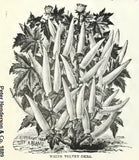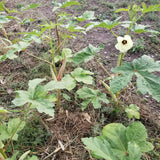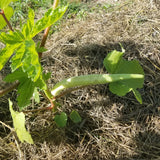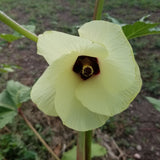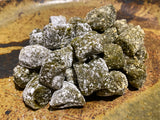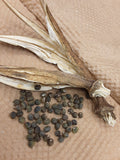White Velvet Okra
(Abelmoschus esculentus); Heirloom; an Ark of Taste variety; a New York State Collection variety; Thornless; Minimum 25 seeds
Who'd have thought?! A southern staple introduced by a New York seed company! This unique white skinned, thornless okra variety was first introduced by New York's Peter Henderson & Company as early as 1888 as suggested by this testamonial in the 1889 catalog:
"I have a fine crop of your "White Velvet" Okra. There are some plants 2 ½ feet high with 22 pods on them from 7 to 9 inches long. It is a most remarkable and beautiful variety. - Thomas McDorwell, Atlanta, Ga., September 5th, 1888."
A versatile okra, White Velvet's pods which do not harden, are covered in smooth velvet fuzz and should be allowed to dry to the touch before eaten raw or used in recipes. Traditional culinary uses for White Velvet include simple salads, pickles, gumbos and stews, as a side dish with greens and/or peas and batter fried. It is well suited for canning. Okra even features prominently in this vintage style vegan, gluten-free sweet treat recipe.
Okay so why'd we include okra in our gardens, is it really a staple crop? Well, a late night "poking around the web" episode proved rather serendipitious - at least in our opinion. Did you know that okra seeds when pressed expel an oil high in unsaturated fat that is both edible and suitable as a biofuel?!? This was the game changer that lead us to grow okra - it is a challenge to store fats & oils longterm. In addition to its pods providing important vitamins and minerals, another benefit of growing okra is its leaves are akin to beet or dandelion greens. And! the fibers in its stem are useful for making cordage or rough cloth - always a useful tidbit to have tucked away on a resilient homestead.
Please see our bulletin Okra - Abelmoschus esculentus: Plant, Grow, Use, & Save Seed








